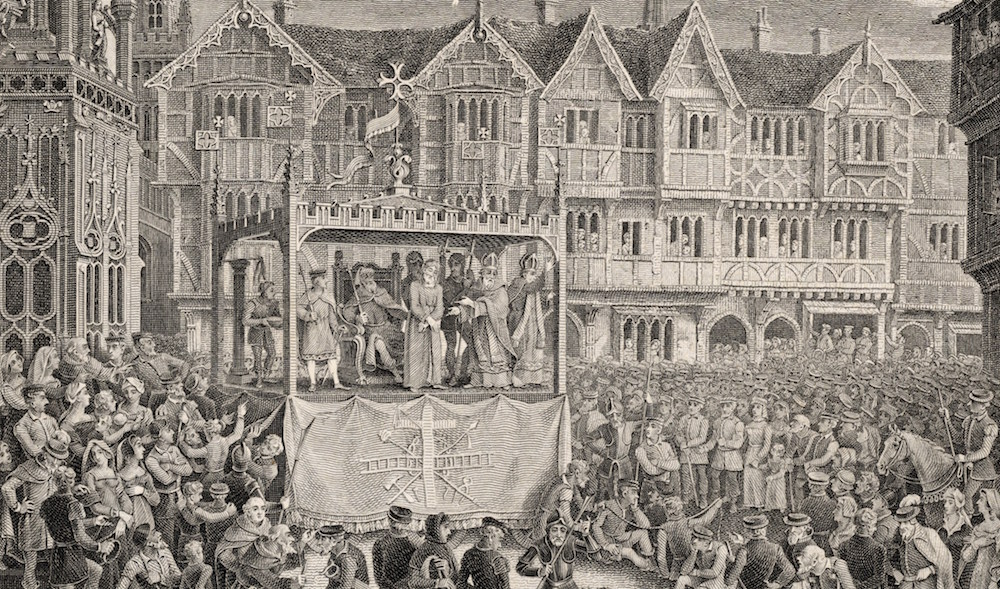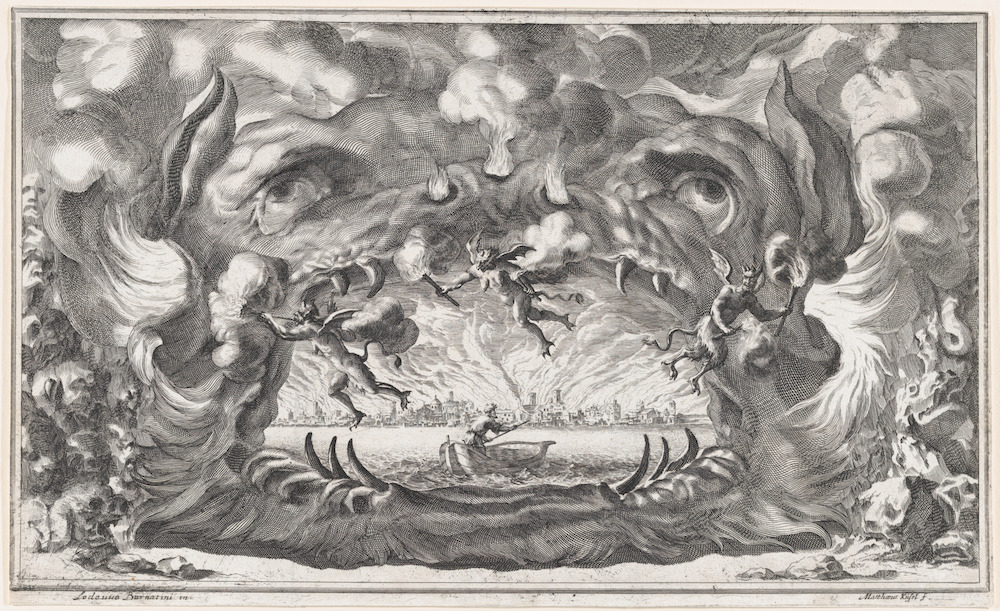In the Middle Ages, ‘mystery plays’ were a popular genre of public entertainment. The performances told stories from the Bible or from the lives of saints in a spectacular fashion. One of the most popular forms told the history of the world, from Creation to the Last Judgement, across multiple stages erected in the town square, complete with wild props and fireworks. Let’s build an adventure with one of these mystery plays as its centerpiece!
Because RPGs are usually only fun when the PCs are interacting with something cool, not just witnessing it, we need to get the party inside the mystery play. Maybe some foreign dignitaries are in town to see the show, and the aldermen are concerned that someone is going to interrupt the play to make the city look bad. So they rope the party into providing security from inside the show. Or maybe the play contains within it an important religious or magical ritual, obfuscated by all the pageantry. Heretics or cultists have figured this out and are going to try to disrupt it. Guards will be present in force, but the PCs have to go inside the play and protect it without disrupting it. No matter your plot hook, what’s important is that the PCs have a vested interest in seeing the show performed as intended, and that someone is trying to stop that from happening. The show must go on!
Don’t stress over fitting mystery plays to your setting. In a fantasy setting, the play is religious instruction. In the modern day or near-future, it’s a historical theater production (some towns in Europe have been performing the same mystery play for centuries as a matter of tradition). And in virtually any other setting, you can justify the play as being a mere work of fiction, albeit one with high production values.

In a play about the history of the world, the best roles for the PCs are those of devils! Devils in mystery plays wore masks and animal skins and outrageous costumes. Sometimes the costumes even had built-in firecrackers! These were not speaking roles, and the get-ups were so outlandish that no one would recognize the PCs. Plus, devils got to mime a lot of fart jokes – and who doesn’t like fart jokes? As devils, the PCs can wander around more or less freely, and go where they feel they’re needed, as long as they don’t interrupt the action.
Mystery plays often had multiple stages, where different parts of the story would be told. Heaven usually had a ladder leading skyward, and you might have stages for various earthly locations (Jerusalem, the wilderness, etc.). But the best stage – and the one that got the lion’s share of the budget – was Hell! That’s also convenient, because if the PCs are devils, they’ll be spending most of their time (and therefore their attention) on the most spectacular set. Note, though, that while the PCs-as-devils might be able to roam free on earth, they won’t be able to enter the Heaven stage. If the bad guys figure out that the PCs are devils, they might dress themselves as angels to hang out in Heaven. The PCs won’t be able to get close to the heaven stage without disrupting the show.
But the Hell stage! The Hell stage was usually decorated with a full hellmouth: the fanged jaws of a terrible monster, often with fire and smoke and chains and sound effects. In fancy productions, the jaws of the hellmouth were so big they were built around the stage. The action occurred literally inside the jaws of Hell. In less fancy productions, the hellmouth was built on scaffolding over the stage, and the action occurred beneath them (in the belly of the beast, as it were). As time went on, hellmouths became progressively more ornate: flaming sulfur, cannons, jaws that could open and close, and even entire teams of crew members beneath the hellmouth to operate mechanical toads and serpents and make them spit fire. One of the session’s villains could have monkeyed with one of the fire-sprayers, trying to set the stage alight. The PCs might have to deal with the situation without causing a stir.
(As a fun aside, in the late Middle Ages, mystery plays were put on by the city’s guilds. The Hell scenes were often handled by the cooks and bakers because guild members were used to working with fire and could provide cauldrons for boiling sinners in and pots to bang together for sound effects.)

Mystery plays that told the history of the universe usually began with Creation. Because the act of bringing a universe into being from nothing was rather hard to fake with medieval technology, Creation was usually handled as a speech delivered from the Heaven stage. The first real bit of action was usually the fall of Lucifer, which occurred in the hellmouth. The Hell stage would then go largely unused during most of the Old Testament stories, then swing into action for the Harrowing of Hell. This scene, between the Crucifixion and Resurrection scenes, had Christ descend into Hell to save those righteous ones who had died since the beginning of the world. This scene might have explosions, fires, raucous sound effects, and stage battles between the devils and Jesus! You could even have one of the PCs notice that – unknown to the rest of the cast – someone has swapped one of the prop swords for a real, poisoned sword. The PCs have to find a way to defuse the situation without disrupting the play before one of the actors is unintentionally killed.
After the rest of the New Testament played out, the hellmouth once more came into use in the Last Judgement. Here, the ‘naked’ dead (actually wearing body stockings) parade past the throne of Christ. Those who led wicked lives are banished to Hell, and the devils march them into the hellmouth. The dead in this scene often included obvious stand-ins for real politicians and clergymen, so this scene was always a crowd-pleaser. The Last Judgement is the bad guys’ last chance to disrupt the play. Fortunately, a certain amount of wailing and gnashing of teeth is expected from the souls going to judgement, and as devils, the PCs will be nearby to deal with any plotters who get out of hand. But those whom the Christ actor sees fit to send to Heaven are beyond the PCs’ ability to restrain. Will they be able to spot all the troublemakers and keep the Christ actor from ‘saving’ the wrong souls?






